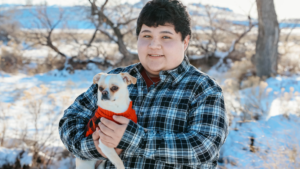This guest post is by Arrianna Nichols, a young woman who is diagnosed with autism and plans to attend University of Alabama in Birmingham. Arrianna is applying for the Spring 2024 Making a Difference Autism Scholarship via the nonprofit KFM Making a Difference started by me, Kerry Magro. I was nonverbal till 2.5 and diagnosed with autism at 4, and you can read more about my organization here. Autistics on Autism: Stories You Need to Hear About What Helped Them While Growing Up and Pursuing Their Dreams, our nonprofit’s new book, was released on March 29, 2022, on Amazon here for our community to enjoy featuring the stories of 100 autistic adults.
The biggest obstacle holding back people with autism like me is the general public’s lack of knowledge and understanding. There are a lot of people in the local community, particularly educators, law enforcement, cashiers, employers and most people in general, who don’t realize how many people they encounter who are autistic.
People with Autism are sometimes singled out by others or even feel intimidated. People with autism may face additional challenges in life while maintaining a sense of wellbeing. We often find ourselves in an uncomfortable environment that overloads our senses, or ends up in an environment alongside people who misunderstand or even discriminate against them.
As if there is a link between an Autistic situation and social anxiety, then that would help me understand why I ended up rarely leaving my home. Staying home gave me comfort, joy, and the safe situation I need to live and work well. I love working. I also love my home as I’m less disabled inside my home where I know how things work. And it makes sense to spend most of my energy here because I’m comfortable at home.
People need to know about autistic related disabilities. I can remember times when I would walk into a store and someone would not hear or understand what I wanted to say or didn’t have the patience to wait for me to formulate the thoughts into words. At times, there was no empathy either. Walking around, knowing that people may not understand how your brain works, how you feel, or how intimidating the outside world is, can be quite frustrating.
Helping me help others start with learning about the characteristics of an individual with autism. The difficulties are communicationare and trying to understand. A good example would be when being pulled over by a police officer. Most of the time, people are nervous and very jerky in movement during these situations. While not all officers, an officer may at times take our slow response to lack of respect, or that we will be violent.
Disability is largely a result of how people interact with their environments. When we talk about the problems we face, much of them are caused by Autistic phobia. Problems at school and work lead to depression, (social) anxiety, financial insecurity, and suicide.
Self-discovery can be a challenging journey for an autistic individual. Self-acceptance and love are something that I am learning. The journey will always be filled with highs and lows. My friends and teachers often ask me what has been the biggest challenge is . It is difficult to socialize with others and make the change from child to adult. My life didn’t change much as a result of those answers, despite their significance. Having carefully considered my options, I came up with an answer that most autistic people would agree with.
Young adults with ASD often have marked differences from others in the way they communicate, behave, and learn. These differences can cause problems with social interactions, which in turn can lead to problems at school, stress within their families and social isolation. They may become the target of unkind jokes and bullying. In a crowded classroom, teachers may struggle to accommodate their unique learning styles and needs.
Unless they have exceptional abilities or encouragement, teens with ASD may not continue their education after high school. As they move into adulthood, they may have trouble getting and keeping a job; they may need to rely on family members for a place to live. Almost 40% of teens and adults with ASD spend limited or no time with friends.
I am easily distracted by noises and distractions when I am trying to pay attention. I sometimes have trouble keeping up with what my mom tells me to do especially if she tells me too much at one time. So continuing my education is my way to climb the career ladder even with my challenges from being on the spectrum. By continuing my education. I am learning valuable skills that I can apply to my day to day job. It can help me become better at regular skills that might otherwise be time consuming. I may even be able to take on new responsibilities that I may have not had the skill to do before. I have had issues with concentration in class and have issues focusing on the class content. If I am not interested in the subject being talked about, then I will quickly lose interest.
So, I often wonder why so many inclusion activities, especially mainstream type things, don’t really address the reality that the reason we struggle to find and maintain stability in school, at work, and even at home and in their communities is due to the negative attitudes people have towards us.
Follow my journey on Facebook, my Facebook Fan Page, Tiktok, Youtube & Instagram.
My name is Kerry Magro, a professional speaker and best-selling author who is also on the autism spectrum. I started the nonprofit KFM Making a Difference in 2011 to help students with autism receive scholarship aid to pursue post-secondary education. Help support me so I can continue to help students with autism go to college by making a tax-deductible donation to our nonprofit here.
Autistics on Autism: Stories You Need to Hear About What Helped Them While Growing Up and Pursuing Their Dreams was released on March 29, 2022 on Amazon here for our community to enjoy featuring the stories of 100 autistic adults. 100% of the proceeds from this book will go back to our nonprofit to support initiatives like our autism scholarship program. In addition, this autistic adult’s essay you just read will be featured in a future volume of this book as we plan on making this into a series of books on autistic adults.













